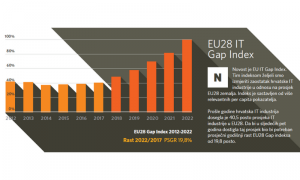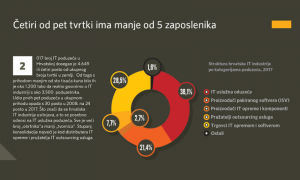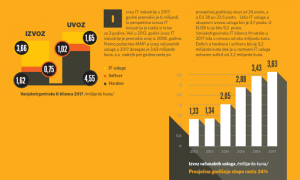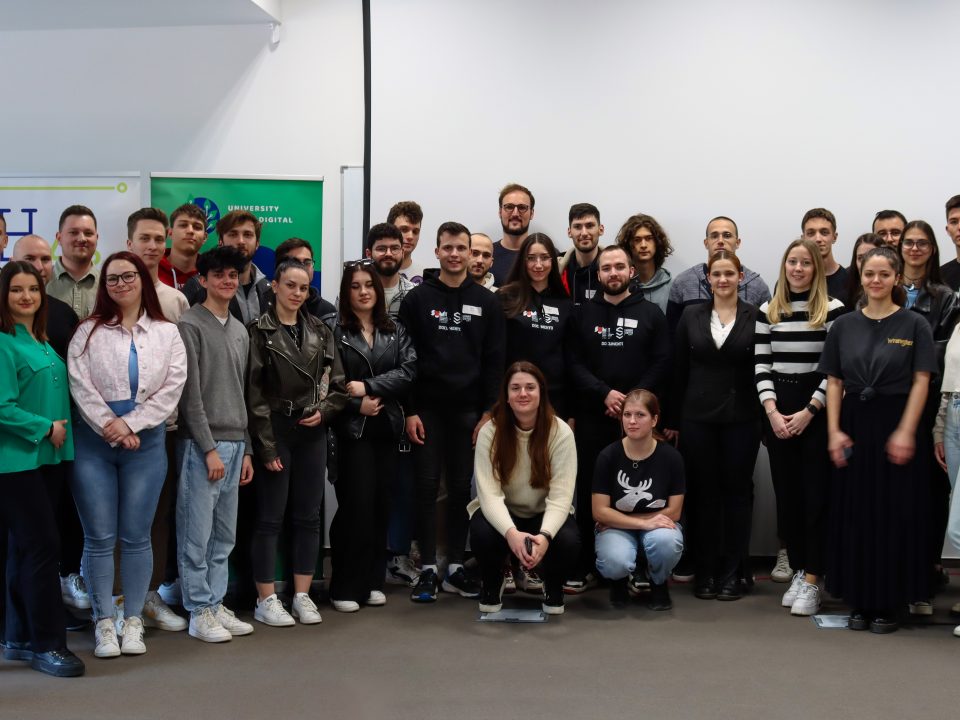
UNWTO competition for startups in gastro tourism in cooperation with a culinary center from the Basque Country
09/01/2019
CES 2019 was held, the largest consumer electronics fair in the world
14/01/2019While other industries were making ends meet, and consequently laid off people, the IT industry in Croatia employed an additional 11,000 people. While some industries are still significantly suffering from the consequences of the crisis, the IT industry is already in 2012. exceeded exports in 2008.
These are some of the more positive data from the Analysis of the Croatian IT Industry 2008-2017. which was commissioned by the Association for Information Technologies at HGK in order to provide an insight into the contribution of the IT industry to the national economy through employability, contribution to GDP and the volume of tax revenues, as well as the level of technological competences and the development and research potential of the country. Although the basic data was presented a few days ago, a more comprehensive analysis on over 100 pages should be publicly available in the near future, and until then, let’s go through what is currently possible.
The analysis, which was carried out in October this year in cooperation with SPAN, was followed by a panel discussion “Croatian IT industry – the next five years” in which Nikola Dujmović participated, Boris Žitnik from Omnia Consult, Ivan Maglic from Calisto and Gartner Adriatic, Anita Cvetić from Ores from Business Intelligence and CISEx and Hrvoje Balen, vice president of HUP’s ICT Association.
Although in the introduction Dujmović concluded that from now on they wanted to do the analysis every year, it took them a long time until this moment. Something was already tried last year, some statistics already existed, but we wanted to get something comparable to EU data, but also harmonized according to the local situation, for which we had to develop our own methodology.
It is this comparability with other members of the European Union that has brought an important context, because it can be used to measure the state’s need for attention to industry, when we see that countries that had similar circumstances and no better start, today already have an enviable advantage. (And that comparison becomes much more important due to factors outside the IT industry than those within it.)
Dalibor Suboticanec, one of the SPAN researchers who presented the data, emphasized how the export of the IT industry has transformed since 2008. until 2017 year, especially the export of service IT companies , which had constant growth despite the crisis.
Well, even though it’s 2017. according to the share in GDP, the IT industry was positioned among the activities with a smaller share, in terms of the growth dynamics of the newly created value in the last 10 years, IT lagged behind only energy and water and gas supply. Finally, the fact that the analysis comes to is that in the last ten years the IT industry grew seven times faster than the GDP of Croatia .
If we look only at the last five years, the income of IT companies increased at an average annual rate of 7.5 percent. Of this , the turnover of the IT industry in the country is growing by 6.1 percent , and exports are growing almost twice as fast. In the same period, the turnover of the entire Croatian economy increased by 2.1 percent.
While the total number of jobs in the country grew by only 0.2 percent, the number of employees in the IT industry in 2017 in 2010 it exceeded 28 thousand and in the last five years it has been growing at an average annual rate of 8.5 percent. Average net salary in the Croatian IT industry in 2017. in 2008, it was HRK 7,722 and was 44% higher than the average net salary in the economy.
However, apart from good growth indicators, not only because of colleagues who will use this information strategically, but also because of political actors, it is important to point out that despite many pluses, Croatian IT still remains in the red today. How much – Subotičanec points out:
Seen from the perspective of the EU market, we are not doing well. Last year, the Croatian IT industry reached 40.5 percent of the IT industry average in the EU28. In order to reach that average in the next five years, an average annual growth of the EU28 IT Gap Index of 19.8 percent would be required.
One of the causes of this backlog is the fact that ICT is not of strategic importance to the Government, but also much bigger problems, at the level of the entire economy. Hrvoje Balen touched on the high salary burden , but also the lack of IT experts .
When we look at the results of the analysis, we come across more “holes in the system”. In 2017 In 2008, the number of IT companies in Croatia exceeded 4.5 thousand, or 4 percent of the total number of companies in the country. We cannot be too happy about these figures if we look at the increased trend of self-employment, but also the fact that four out of five IT companies have less than five employees .
Of course, self-employment could be highlighted as a positive indicator, but, as Dujmović points out, the countries where it is easiest to start a business have the fewest companies per capita:
The study revealed that we are one of the few countries where the consolidation of IT did not happen, but quite the opposite. A lot of people start businesses to pay a flat tax, which is a good tactic at the individual level, but a bad strategy at the state level.
Then he concluded that self-employment is the strategy of the poorest countries , not the richest. This fact is very well supported by the recent results of the Eurostat report on the motives for starting one’s own business.
There were repetitions of concepts, what is industry and what is the market, but regardless of the knowledge of terminology, one thing is certain, as Anita Cvetić from Oreščanin pointed out, our market is too small for the potential that domestic industry can achieve. Consequently, the outsourcing of body shopping took place:
We are all in 2008. had to choose whether to lay off people or go to the external market, so of course we decided on the latter. There, as a company, we got higher prices for our products, legal security and new opportunities, but our IT market lost out.
Nevertheless, Dujmović sees an opportunity at the level of digitization and digital transformation, explaining that if there are no customers for digital solutions, then there is no development of the future .
In this context, Maglić said that it will be easiest to reach them and influence them if the companies in the sector know how to defend the industry themselves:
The potential of the market to absorb our products is important and we must emphasize this in future studies.
Exactly how they can defend the industry themselves is the golden point of the analysis as well as the panel .
When we look at the information and the conclusions that have been reached, we are aware that the IT industry certainly has valid arguments with which it could present itself in front of government bodies and other decision makers. We know, even without this information, how IT can become a key factor in future development, but it seems that switching to what “should” often fails due to a lack of assertiveness on the part of IT actors, as Maglić explains:
It is very important to point out why we are here today. We must all learn to understand our industry together, first ourselves, and then the second step is to present it where it should be, both to the prime minister and the government, and to members of parliament. We are geeks by nature and what we know, we don’t know how to communicate . We need to work with the terms of GDPR and the impact of the industry in the overall economy so that we can always and at all times have a relevant conversation with the factors based on these figures.
In addition to the domestic analysis data, which can be upgraded by reviewing other IT industries in the Union, it seems that the only thing that can bring us closer to the EU average faster is a concrete lobbying plan towards the Croatian political elite. But who will, who has time?
However, if those who direct the way you run your business do not understand the seriousness and importance of IT, isn’t it worth taking the time to explain some things to these actors? And more than once?
The panel also mentioned the importance of the managerial milieu – specifically lack of managers who understand IT and the potential of digitization, as well as digital transformations, but I would also highlight those from the IT industry who equally understand the sales aspect, because ultimately, they need to know how to sell and package their part of the IT pie to customers, investors, but also to the rulers.
Our business scene is small, so private tapeworms will always find fertile ground, but perhaps it is more important than ever that people who have the potential for it accept the roles of a kind of lobbyists (not to mention influencers ) in order to finally place IT where it deserves. Now we certainly have the data to tackle it.
Source: Netokracija (https://www.netokracija.com/hrvatska-it-industrija-analiza-153795)





























